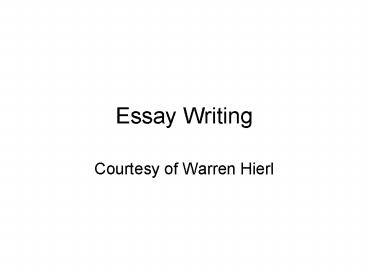Essay Writing PowerPoint PPT Presentation
1 / 12
Title: Essay Writing
1
Essay Writing
- Courtesy of Warren Hierl
2
- Writing is thinking on paper. It doesnt matter
how well you say nothing, it is still nothing.
There is ONLY one best choice and arrangement of
words to express a given idea - You are writing to impress an AP reader who will
have approximately 2 minutes with your essay. You
must convince the reader that you are an
intelligent life-form.
http//www.alienabductionhelp.com/hamilton_aliens.
jpg
3
- Read the question carefully and focus your
discussion on directly answering that question.
Emphasize the following - Analyze or assess the DEGREE to which a statement
is true - Analyze or assess the IMPACT of an event or
concept on some aspect of American society - Analyze or assess the RELATIVE IMPORTANCE of
various factors on an event or concept. - Analyze or assess the EXTENT to which a
historical stereotype is true for a given period
or concept - Analyze or assess the REASONS that cause a
particular movt to develop - COMPARING and CONTRASTING differing attitudes
toward a general concept or policy or different
factors over time.
4
- Analyze means examine HOW and WHY
- Use the core structure (let me go over this with
you)
5
- Hit em with a brick Begin with a
well-developed thesis statement that does more
than repeat the question. It should - ANSWER THE QUESTION
- TAKE A POSITION
- ESTABLISH ORGANIZATIONAL CATERGORIES
http//www1.istockphoto.com/file_thumbview_approve
/1060063/2/istockphoto_1060063_single_brick.jpg
6
- I. Well developed thesis statement that directly
answers the question, takes a position
(interpretation), and establishes organizational
categories. Your thesis statement should NOT be
longer than two sentences. - A. Most important topic sentence which
introduces the category to be discussed, directly
answers the question, and takes a position on
this particular category. - 1. Most important specific factual information
(SFI) which demonstrates both knowledge of the
material and an understanding of how this
information supports the thesis (interpretive
commentary). - 2.Next most important same as above.
Interpretive commentary. - 3. Next most important same as above.
Interpretive commentary. - 4. Next most important same as above.
Interpretive commentary. 5. Clincher
sentence which ties the paragraph directly back
to the thesis. - B. Next most important topic sentence which
introduces the category to be discussed, - directly answers the question, and takes a
position on this particular category. - 1. Most important specific factual information
(SFI) which demonstrates both knowledge of the
material and an understanding of how this
information supports your thesis (interpretive
commentary). - 2. Next most important same as above.
Interpretive commentary. - 3. Next most important same as above.
Interpretive commentary. - 4. Next most important same as above.
Interpretive commentary. - 5. Clincher sentence which ties the
paragraph directly back to the thesis. - C. Next most important topic sentence which
introduces the category to be discussed, directly
answers the question, and takes a position on
this particular category. - 1. Most important specific factual information
(SFI) which demonstrates both knowledge of the
material and an understanding of how this
information supports your thesis (interpretive
commentary).
7
- Begin each paragraph with a topic sentence which
defends your thesis and directly answers the
question and support it with as much specific
factual information as you can. Do not merely
list or describe information but use it to prove
your thesis. Explain how and why the specific
information supports your point of view
(interpretative commentary) Avoid vomit essays
in which you merely throw-up information in a
random matter without relating it back to your
thesis.
http//asuartmuseum.asu.edu/cuba/vomit.jpg
8
http//xrlq.com/Images/ugly_sam.jpg
- Kill the damn dog
- Keep your essay focused on answering the
question. - The reader knows how this will turn out so just
kill the dog - Example
- "See Spot run. Spot runs past Dick. The grass
is wet. See Spot run past Jane. Dick has a
stick. The sun is shining. Hear Baby cry. Spot
runs into the road. Spot gets hit by a car." - "While running across the yard to avoid being
hit by a stick that Dick was swinging, Spot was
blinded by the morning sun reflecting off the
dewy grass, ran into the road, and was hit by a
car.
9
- End each paragraph with a clincher sentence that
ties the entire paragraph directly back to the
thesis statement.
http//www1.istockphoto.com/file_thumbview_approve
/2418881/2/istockphoto_2418881_important_remember_
ribbon_tied_on_finger_as_reminder_close_up.jpg
10
- Always focus on the complexity of history.
Demonstrate that you understand the concept of
multi-causation/ multi-effect. Bring as much
depth and breadth into the essay as possible.
http//www.tml.tkk.fi/pnr/FAT/Cellular-Complexity
.gif
11
http//upload.wikimedia.org/wikipedia/commons/1/1d
/Unclesamwantyou.
- Essays must always be written in dark blue or
dark black ink. Penmanship, spelling, and
grammar make a difference because they
subconsciously affect the ability of the reader
to extract information from your essay and they
interfere with the logical flow of the essay.
Use only past tense and DO NOT attempt to make
your essay relevant to today's world. Use only
third person. Avoid starting sentences with
pronouns.
12
- The question every reader asks themselves at the
end of an essay is, "How sophisticated a
knowledge of history has this student
demonstrated in this essay?" The demonstrated
level of sophistication will ultimately determine
the grade. - REMEMBER THE CORE STRUCTURE

